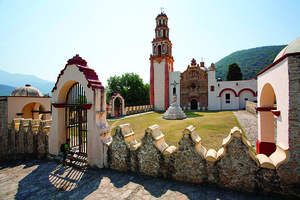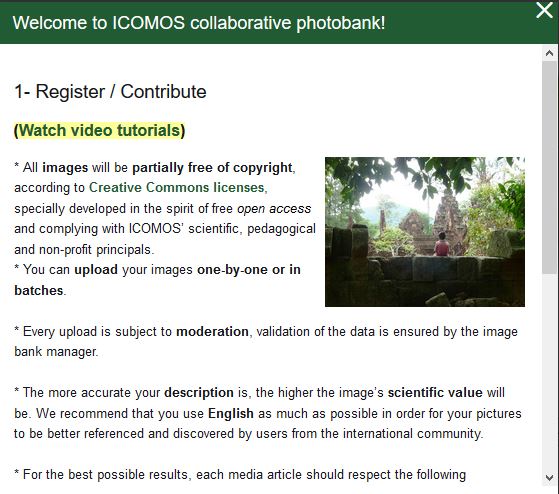18 April 2020 | Shared Cultures, Shared Heritage, Shared Responsibility
 Every year, on the occasion of the International Day for Monuments and Sites, ICOMOS proposes a theme for the celebrations and activities to be organised by our Committees, members and partners.
Every year, on the occasion of the International Day for Monuments and Sites, ICOMOS proposes a theme for the celebrations and activities to be organised by our Committees, members and partners.
Now, more than ever, the theme of Shared Cultures, Shared Heritage, Shared Responsibility is important as an expression of our global unity in the face of the ongoing worldwide health crisis.
The 2020 International Day for Monuments and Sites invites participants to explore the idea of sharing—and its counterpoints, contestation and resistance—in relation to cultures, heritage and responsibility.
Given the current global outbreak of Covid-19 and the containment measures in different countries around the world, ICOMOS encourages you to celebrate the International Day for Monuments and Sites in compliance with instructions from local and national authorities so as to ensure the safety of participants.
Read further below for suggestions on how to celebrate 18 April remotely and with the power of the Internet!
 Download the 18 April 2020 leaflet in: English - French - Spanish and the official logo of the day and poster.
Download the 18 April 2020 leaflet in: English - French - Spanish and the official logo of the day and poster.

Why ‘Shared Cultures, Shared Heritage, Shared Responsibility’?
The theme for ‘Shared Cultures, Shared Heritage, Shared Responsibility’, reflects the global context of heritage as part of cultural identity at a time of rapid population shift, conflict, and environmental uncertainty. The theme recognises that heritage – whether places, landscapes, practices, or collections – are frequently connected with and valued by multiple and diverse groups and communities. At its core, the overarching theme is concerned with the relationships between cultures or cultural groups and their collective responsibility for the care and safeguarding of the significant attributes, meanings, and values of heritage.
However, the idea of ‘shared’ is intentionally provocative. In an historic sense, cultures and societies have commonly shared cultural practices, ways of doing, and viewpoints. Nevertheless, in some cases these features have been forced upon populations and resisted rather than collectively adopted (e.g., religious beliefs). In other instances knowledge and practice may be closely guarded and thus not shared (e.g., in many Indigenous cultures). Additionally, some heritage items have been destroyed or damaged for what they symbolise (e.g., the Buddhas of Bamiyan), thus resisting any sense of sharing or ideological tolerance. More typically in the work of heritage, the values of places can be contested leading to debates about their conservation (e.g., Sydney’s Sirius building).
In adopting the term ‘shared’, the 2020 International Day for Monuments and Sites invites participants to explore the idea of sharing—and its counterpoints, contestation and resistance—in relation to cultures, heritage and responsibility. It invites reviews of traditional thinking on the topic and seeks new and diverse perspectives and insights that encourage discussion and dialogue.
Connecting with the ICOMOS GA2020
The theme of ‘Shared Cultures, Shared Heritage, Shared Responsibility’ is also the overarching theme of the ICOMOS 20th General Assembly and Scientific Symposium (GA2020) that will take place in Sydney, Australia from 1-10 October 2020. The ideas and enthusiasm shared as part of the 2020 International Day for Monuments and Sites will directly contribute to GA2020 (see Scientific Symposium theme descriptions here).

How to Participate Virtually
ICOMOS invites you to celebrate 18 April related to the Shared Cultures, Shared Heritage, Shared Responsibility theme, with the aim of raising awareness of its values and conservation. Possible activities include virtual conferences and round tables, webinars, online lectures, poster presentations, livestreamed interviews, press releases, round tables, visits to heritage properties, heritage walks, social media campaigns, etc.
Ideas for Celebrating Remotely
Post photos and information on shared cultures and shared heritage in your country, and the heritage or practices associated with these, including short slideshows or videos (under 30 seconds). Make sure to include descriptions, quotes or facts to accompany any image, as well as hashtags.

Share virtual tours and videos of heritage places through social media. For inspiration, check out Google Arts & Culture, which provides free, virtual access to a number of cultural heritage sites worldwide.
Host webinars on heritage-related topics and invite others to join the discussion. Share your favourite podcasts about cultural heritage, like “Culture Speaks” by UNESCO.
Using Twitter threads, tell a story about your community’s connections to heritage, your cultural traditions, or what it means to share responsibility for conserving cultural and natural heritage. Don’t forget to use images and hashtags!
Sharing via Social Media
18 April is one of the best channels for disseminating ideas for the protection of cultural heritage and communicating on the theme of the day. It allows everyone to participate in raising awareness and in sharing in that great enthusiasm the 18 April generates.
Use these hashtags to join 18 April celebrations:
#18April
#ICOMOS
#SharedCultures
#SharedHeritage
#SharedResponsability
#IcomosIDMS2020
Let us know how you will celebrate!
Please inform the ICOMOS International Secretariat of planned 18 April initiatives so that we can publish them on the ICOMOS website and share your activities among the members of the worldwide ICOMOS family.
Please send the information to: calendrier[at]icomos.org using the format below (please use short sentences to enable a concise presentation and mention “18 April event – your Committee” in the email subject line):
- Title
- Who? Organisers
- What? Short presentation of the activity
- When?
- Where? Country, town
- Official contact
- Official website
- Attachments: Poster / leaflet
See also:
![]() View events for 18 April 2020 on our interactive map
View events for 18 April 2020 on our interactive map
![]() Check out our Looking back on 18 April 2019 and discover the highlights of this day with our image reports.
Check out our Looking back on 18 April 2019 and discover the highlights of this day with our image reports.
Photos:
1/ Ile de Gorée, Sénégal © Françoise Gaujour / Flickr CC-BY-NC-SA
2/ Misión Tilaco Sierra Gorda Querétaro, Mexico © Comisión Mexicana de Filmaciones / Flickr
3/ Ottawa sculpture of a native Candian © Perry Mc Kenna / Flickr CC-BY
4/ Aboriginal woman, Australia © Steve Evans / Flickr CC-BY
5/ Saigon, Viet Nam -Franco-Chinese Bank, 1959-1961 © Mahaim / Flickr CC-BY-NC
6/Sirius western elevation viewed from Cumberland St / By Katherine Lu -Own work, CC BY-SA 4.0

